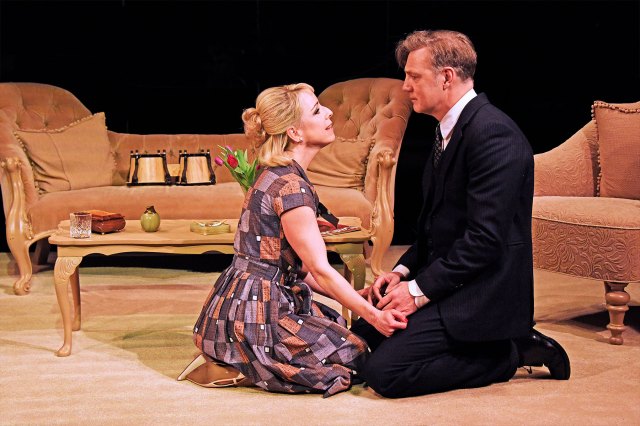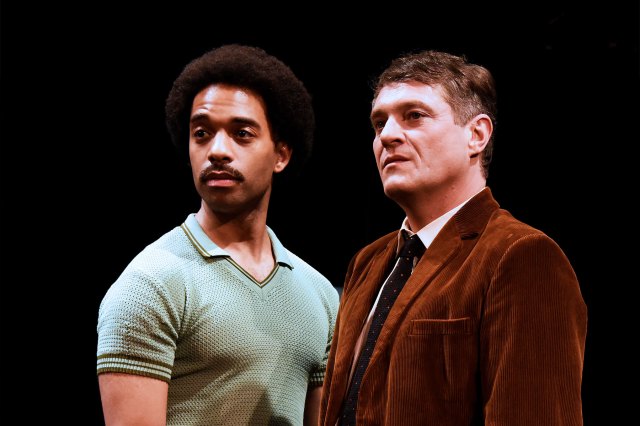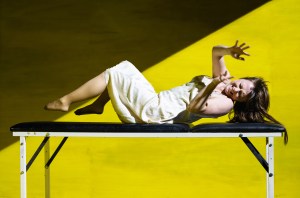The Lover/The Collection at Theatre Royal Bath’s Ustinov Studio – review
The Pinter double bill runs until 20 April

Harold Pinter and the Ustinov share some common ground in that each is the creator of miniature that produces a maximalist effect. Pinter’s work, on the surface, appears to be small fry, full of domestic suburbia and conversations that spiel in ever-increasing circles, never fully resolving, but within contain huge, painful human emotions and questions about society that feels ahead of its time. Meanwhile, the Ustinov, this small studio of just over 100 seats tucked away to the side of the Theatre Royal Bath’s main house, consistently produces work of epic proportion that, in terms of clout and ambition, greatly exceeds its humble origins. Machinal is but the latest show to find post-Bath success.
These two one-acters, The Lover and The Collection, originally written for television in 1962 and 61 respectively, are works that suggest the trappings of ordinary suburban relationships, dullness given a dash of menacing edge by a hint of matrimonial affair, either as game or rumour. Pinter, a man who had his own complicated married life, seems to be alive to the erotic fixations of adding a third. The role-play games of Richard and Sarah in The Lover, keep the amour alive even as Richard enquires whether his wife has shown her lover “the hollyhocks”.
Pinter’s use of language, with its delicious equation of syllables and onomatopoeic sounds, lands beautifully in the space, but it’s in the frisson of whether the couple actually can only exist in happiness with their own mistresses and lovers that gives the play an edge. Harry and Sarah may only be role-playing the afternoon assignations, but when Harry begins to crack, realising that it may be the ‘lover’ rather than the ‘husband’ who she prefers, the pain of married life is laid thin. In the year before Edward Albee killed off a child in a parlour game in Who’s Afraid of Virginia Woolf?, Pinter has his own form of destruction here.
The more fascinating and mysterious work is The Collection which begins with a 4am phone call and ends with four souls all unsure of how to proceed. Did Bill sleep with James’ wife Stella in a hotel in Leeds, and in doing so has he unearthed an inherent desire in the cuckolded husband that causes tension in Bill’s older boyfriend and benefactor Harry? The core idea of power dynamics, and with each sentence loaded with subtext that both clarifies and mystifies in equal measure, is a work that feels quintessentially Pinter.
Director Lindsay Posner, in two-period adjacent sets by Peter McKintosh, with mirrors at the back reflecting the audience to itself as its own form of voyeurs, is sensitive to the use of language and atmosphere, if slightly lacking in dynamic stagecraft.

For those like me, who can sometimes struggle to stay on side with Pinter’s lack of definitives, the main reason to see it is the terrific dual performance from David Morrisey who brings both Richard and Harry to aching life. Morrisey has the uncanny knack of equally bringing decency and menace to roles. In The Lover, he is all smiles as the ‘darling I’m home husband’, all threat as the geezer who comes a’knocking in the afternoon. In The Collection, he is all minuet hand flutters and vain posturing as the older lover who seems to hold the cards in his relationship with his younger dress designer partner but can’t control the lust he engenders in others. Multi-rolling these two parts together, makes the evening feel more star-led than other casting itinerations recently seen in London productions, but Morrisey handles this double (or is it five roles) and is worth the ticket price alone.
He is ably supported by Claudie Blakley as the two women; all high-heeled slinkiness for her lover in the first, all inscrutable reasoning in the second, as she lounges on the sofa, stroking a slightly petrified-looking cat, we get the sense that though Pinter quite often made his female roles the driving forces, they rarely get the chance to be the protagonist. Mathew Horne demonstrates that lust and violence make elegant bedfellows, stroking a blade-like he is unsure whether to caress or impale it into his potential love rival. Meanwhile, Elliott Barnes-Worrell is all sensuous charm as Bill, seemingly holding everyone in thrall to his magnetism.
Perhaps there is a sense in these shorts that we are being served a couple of entrées rather than a main and so leave feeling slightly undernourished. Faithfully done, effectively performed, but it feels like a prelude to something yet to come, in this case, Richard Jones’ revival of The Birthday Party later this summer.















